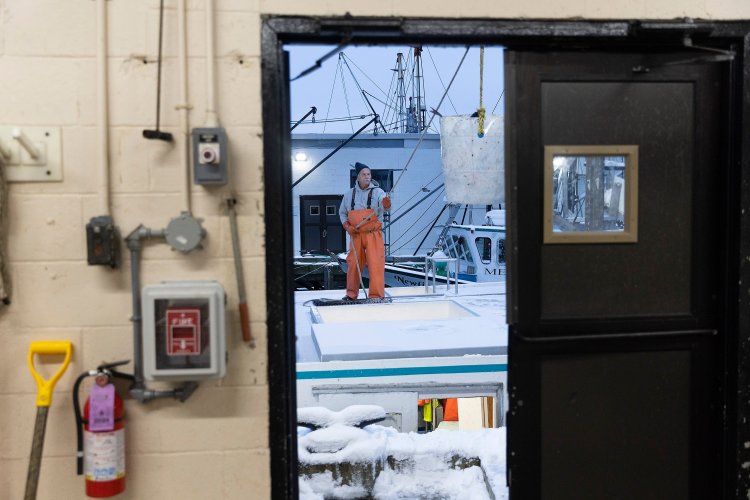This article is Maine specific, but it's happening all along the East Coast. The article itself was over the character limit, so I attached a PDF with the entire article. It's a good read...
March 2, 2025

Ralph Ferrante tends the hatch as fish are offloaded from the fishing boat Brittany Lynn at Portland Fish Exchange. Derek Davis/Portland Press Herald
On Randy Cushman’s final fishing trip, he looked out at the sea and said, “thank you.”
“It’s been quite a ride,” he told the fierce winter wind and the churning waves and the fish beneath them.
The 63-year-old is a fifth-generation fisherman. He went out on his first fishing trip with his dad at age 5. By the time he was 20, he was captaining a boat out of Port Clyde.
Now, after more than four decades as a groundfisherman, Cushman is preparing to sell his boat and is looking for a new job. He’s applied for positions at Walmart, the YMCA and car dealerships.
“In a lot of ways, I feel like I died,” he said. “But you can’t keep doing it just to do it. I couldn’t do it anymore.”
Cushman isn’t the only one throwing in the towel. According to the Maine Coast Fishermen’s Association, there were more than 300 boat operators catching cod, haddock, pollock, halibut and flounder for a living in the early 1990s. In 2024, there were around 30.
Once a major economic engine of Maine’s coastal region, the groundfishing industry is disappearing. At grocery stores and markets across Maine, it’s often easier to find cod caught in the Norwegian Sea than in the Gulf of Maine.
Fishermen, scientists and advocates chalk the sharp decline up to a tangle of issues: unstable markets, regulatory changes, outdated science, competition with countries like Iceland and Norway and depleting fish stocks.
Young people from groundfishing families like Cushman’s are going into lobstering and scalloping. Old-timers are selling their boats. Scientists and fishermen alike say that without some big changes, the industry may not survive in Maine.
Maine’s groundfishing industry is in decline. Saving it is complicated.
March 2, 2025

Ralph Ferrante tends the hatch as fish are offloaded from the fishing boat Brittany Lynn at Portland Fish Exchange. Derek Davis/Portland Press Herald
On Randy Cushman’s final fishing trip, he looked out at the sea and said, “thank you.”
“It’s been quite a ride,” he told the fierce winter wind and the churning waves and the fish beneath them.
The 63-year-old is a fifth-generation fisherman. He went out on his first fishing trip with his dad at age 5. By the time he was 20, he was captaining a boat out of Port Clyde.
Now, after more than four decades as a groundfisherman, Cushman is preparing to sell his boat and is looking for a new job. He’s applied for positions at Walmart, the YMCA and car dealerships.
“In a lot of ways, I feel like I died,” he said. “But you can’t keep doing it just to do it. I couldn’t do it anymore.”
Cushman isn’t the only one throwing in the towel. According to the Maine Coast Fishermen’s Association, there were more than 300 boat operators catching cod, haddock, pollock, halibut and flounder for a living in the early 1990s. In 2024, there were around 30.
Once a major economic engine of Maine’s coastal region, the groundfishing industry is disappearing. At grocery stores and markets across Maine, it’s often easier to find cod caught in the Norwegian Sea than in the Gulf of Maine.
Fishermen, scientists and advocates chalk the sharp decline up to a tangle of issues: unstable markets, regulatory changes, outdated science, competition with countries like Iceland and Norway and depleting fish stocks.
Young people from groundfishing families like Cushman’s are going into lobstering and scalloping. Old-timers are selling their boats. Scientists and fishermen alike say that without some big changes, the industry may not survive in Maine.
